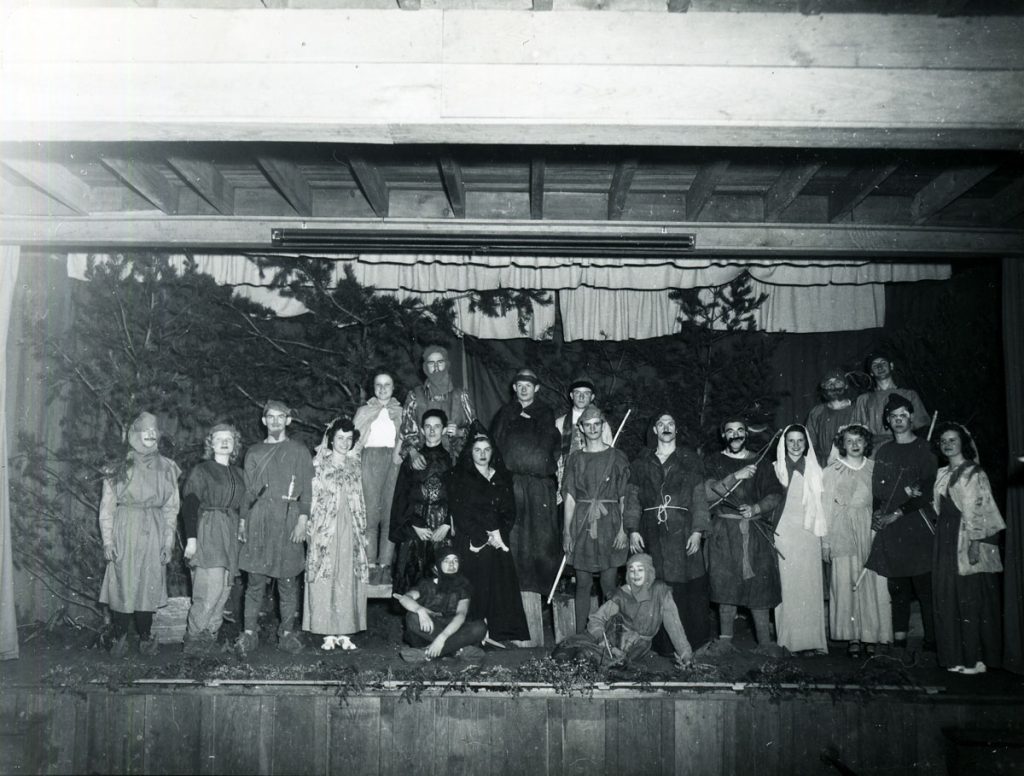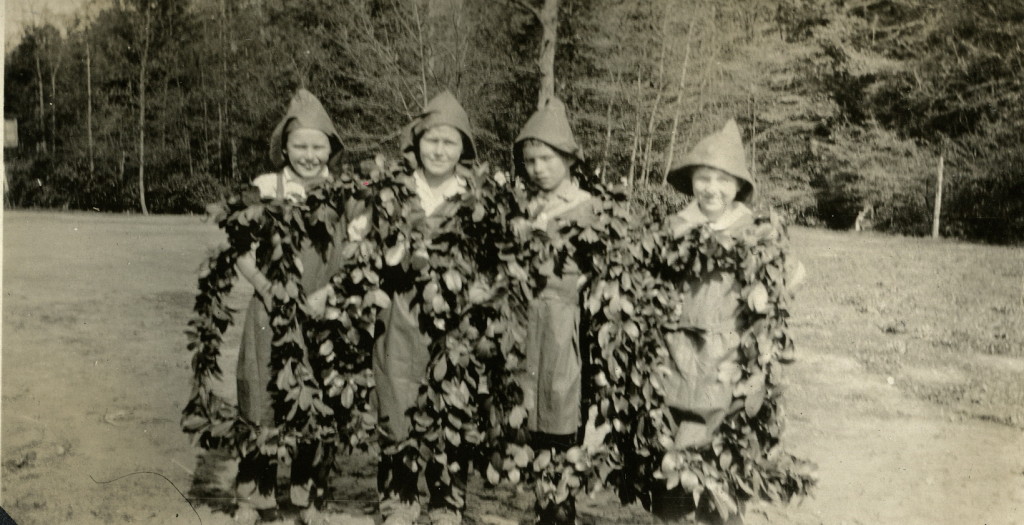Pine Mountain Settlement School
Series 36: DRAMA
Dramatics at Pine Mountain

Mummer’s Play on stage at Burkham School House II, c. 1940s. [Mummers_Play_100.jpg]
TAGS: Theater, drama, pageants, Pine Mountain Settlement School, historical pageants, entertainment, Indians, early history,
Dramatics at Pine Mountain
Theater at Pine Mountain was a very active part of the curriculum and also of the seasonal schedules of the School. Many of the events through the year engaged the whole community. Also, it was not unusual to find many aspects of the surrounding culture mingled with universal and contemporary popular forms of entertainment as the years marched on. Today, many of the pageants and plays of the nineteenth and twentieth century can easily remind us of our social insensitivity during those early years. The pageants were scripted locally and many are an uncomfortable journey into the mid-twentieth -century perception of history and the relationship to the Native American and African American communities. Yet, many of the families in the Pine Mountain valley and hollows were descendents of Native Americans and were mixed -race families, and descendants of Ireland, Scotland, England, and after Wars, — throughout the world.
The common tropes of race and the Indian as noble savage are glaring social transgressions in todays social translation, but the Minstrel Shows, and the pageants were particularly insensitive. It is probably not a mis-reading to note how uncomfortable the students were in their assigned dramatic roles as Japanese in the Mikado, or as American Indians in pageants even in the early years. Theater often wants the audience to be uncomfortable, and pageant scripts now make the audiences uncomfortable, but this was common theater in many educational institutions in the early twentieth century, But, it is not surprising to see the pageant still making many uncomfortable as they look back at this common theater format. It is not likely that discomfort was the intent of the authors of the early pageant scripts. Early theater at Pine Mountain as an unsettling process was not intentional. The combination of contemporary insensitivity and the clear attempt to raise the educational, social and cultural journeys of an isolated population is not an easy road to even try to describe.
DRAMA: Community Celebrations
Like farming, the celebratory events at the School play an integral role in the educational objectives of the early institution. Like the cycles of agricultural life, community celebrations helped to establish the ebb and flow of life at the School and map it to the rhythm of the community. Many annual events such as Community Fair Day, celebrated in the Fall and harvest time; the Nativity Play at Christmas marked the reflection afforded by winter’s seclusion; May Day in the Spring and the School’s former annual Spring Dogwood Breakfast celebrated the rebirth of living things and the nurture they promise. Many celebrations at the School had their origins in a celebration of the seasons and often they paid homage to the natural environment, food or to displays of the successful harvests of produce from local farming.
Past celebrations, pageants, and plays are remembered fondly by many students who attended the School and many of those memories were or are associated with agrarian practice or with a foodway or an agricultural rhythm, or a memory of Indians and of the early Pilgrims. These events were also linked to long traditions that the workers romanticized and that were tied to a strong perceived Anglo-Saxon heritage, to pioneer life, to the Pilgrims, to self-sufficiency, and to a myriad of other partial truths.
Whether performed for entertainment, for educating, or for the celebration of special people, events, time or place, the festivities at the School provided an opportunity for a connection with both the past and the future of the institution in a cooperative celebration process.
In the surrounding community past and present are equally revered but future rarely intruded into daily community conversation. Like dreams, the future was held close like some shining city on the hill or the hereafter. Today, the community of promise seems to some even further away. In conversation and practice community celebrations have steadily declined, as economic despair has increased, and as the boarding school community memory has disappeared. When the collective pageantry and celebratory efforts waned, so did something in the tightly woven fabric of the community. It could be seen to begin to tatter by the late 1960s when the tangled ideals of the War on Poverty and the reality of an economy that failed to diversify caused a shift of focus away from collective entertainment and toward more pragmatic individual entertainment, programming, and post war industrial training.
However, while the Boarding School was active, there were numerous festivities and collective and community entertainments. Generally, the events were associated with holidays such as Thanksgiving, Columbus Day, Halloween, and May Day. More romantic festivities were also devised. Robin Hood’s adventures, the Mikado, H.M.S. Pinafore, the Cooperative Store skits, the Kanagawa play, Halloween, the carrying in of the Yule Log, and the simple dialog of the Nativity Play,. All, gave early students the opportunity to don costumes and assume other personalities and to imagine themselves in other lives, other countries and other times.
“How beautiful upon the mountains are the feet of him that bringeth good tidings, that publisheth peace …” was found written on the wall of a humble mountain cabin. It is a quote from the Bible, but it is also a well-known quote from the annual Nativity Play at Pine Mountain. The Nativity Play continues to be offered each December at the School. The quote was later rephrased as “How beautiful are the feet of youth upon the mountain,” by one of the graduating classes. The deep imagination and innocence of the students who passed trough the School are one of the most endearing traits found in the School’s early history and, indeed, in much of early Appalachian history.
While early institutional celebrations and drama allowed the staff workers to gather and renew their friendships on the campus and were celebrations that brought the School and the community together in cooperative celebrations that bonded the two — this has disintegrated with the ready supply of entertainment on the Web. Yet, the memories carried away from the early and deep engagements persist in families and in the many participants. They are life-changing and continue as part of the cherished memories of the earlier years in the Pine Mountain valley..
SEE:
DRAMA Guide
For a listing of DRAMAS, PAGEANTS, THEATER PRODUCTIONS, PLAYS, etc.


